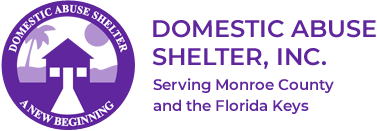HISTORY OF DAS
The Florida Keys are a string of islands off Florida's mainland, approximately 130 miles long. The Domestic Abuse Shelter program started in Key West, the southernmost tip of the islands, in 1978. It began as a grassroots movement shortly after the Monroe County Commission on the Status of Women determined that there was a need for emergency shelter and counseling for victims of domestic violence in Monroe County. Local volunteers set up a network of safe homes and donated their time to providing crisis counseling and information and referrals to battered women. As the demand for services increased, it became apparent that a paid organizer was needed.
In March of 1981 the Domestic Abuse Shelter incorporated and applied to United Way of Monroe County for funds. A grant of $200 per month was approved.
In 1982 the Marathon Business and Professional Women's Club, located 50 miles north of Key West, realized the need for similar services in their area. The Marathon BPW Club, whose chosen philosophy is “women helping women," set up their own local network of safe homes.
In 1983, the two groups joined together in an attempt to provide services for all the residents of Monroe County. The program began using a countywide toll-free crisis line number and attempts were made to establish safe homes in the Upper Keys. That same year, the Domestic Abuse Shelter gained 501(c)(3) status as a charitable organization.
In 1984, the Domestic Abuse Shelter, organization applied to Human Rehabilitation Services for Marriage License Trust Fund monies and a centrally located shelter was finally opened in July of that same year.
In the years after the shelter opened, DAS has seen a huge demand for increased services
– a demand that the organization has met eagerly. Outreach offices are now available in the Upper, Middle, and Lower Keys.
DAS advocates work closely with law enforcement personnel and the State Attorney's Office throughout the Keys.
Although DAS staff believes that we are making inroads into stopping domestic violence in our communities, there is still much to be done. There are various challenges associated with provided services in rural areas; i.e., transportation, geographic layout, information dissemination and confidentiality issues.
DAS MISSION STATEMENT
The mission of Domestic Abuse Shelter, Inc. is to provide victims of domestic abuse, donors and the Florida Keys community at large, safety, accountability, and justice for individuals and families experiencing domestic violence through comprehensive services and community education.
THE DOMESTIC ABUSE SHELTER’S
PROGRAMS AND SERVICES
All services are provided through an empowerment and trauma informed care approach. There are no fees for services.
Shelter: The Domestic Abuse Shelter, Inc. is the only certified emergency shelter in Monroe County that provides refuge for victims of domestic violence and their children. An average stay is approximately six weeks. The shelter is a safe and secure environment that empowers residents through its services to form the beginning of independent lifestyles. Residents obtain crisis intervention, supportive counseling, children’s services, food, clothing, support group counseling and advocacy. All agency services are available to shelter residents. For more information on the shelter, call (305) 743-4440.
Counseling: Counseling services are available via telephone or in person. Counseling is dedicated to helping victims deal with crisis on a long or short-term basis through outreach, individual, or group services. The provision of services is empowerment based, culturally sensitive peer counseling with staff facilitation. For more information on counseling services available throughout the Keys, call (305) 743-4440.
Advocacy: Survivors receive referrals and supportive assistance to use both the civil and criminal justice system. Advocacy within the legal and human services systems is provided for any participant in need of such support. For information on advocacy services throughout the Keys, call (305) 743-4440
24-Hour Hotline: A toll free 24-hour confidential hotline is provided countywide. Trained staff and/or volunteers are available for counseling and referral services regardless of the hour. The hotline is a fundamental link to domestic violence survivors. Individuals receive crisis intervention, supportive counseling, and information and referrals. The hotline number is (305) 743-4440.
Case Management: An action plan is developed by the participant with the support of the advocate. Safety is assessed and a plan to meet the safety needs of the participant is formulated and goals are outlined. Case Management services include: needs assessment, continual development of a service and safety plan, the provision for information and referral, and transportation when available for survivors with multi-needs, ongoing review of social, mental, physical, and legal needs. Case Management plans are reviewed in a timely manner with changes in service and safety plans as the needs of the participant change. Plans and updates are designed to include the unique needs of all children involved.
Information and Referral: Information and referrals are available via the crisis hotline, through individual and group counseling, and in the shelter. All services are available from outreach advocates during scheduled outreach hours. The hotline can be accessed 24 hours a day. For information on outreach offices throughout the Keys, return to the homepage or call (305) 743-4440.
Professional Training and Community Education: DAS provides training to professionals and community members throughout the Keys. Training topics include: overviews of domestic violence, crisis intervention techniques, gender roles and stereotypes. Training can range from a one-time, hour-long session to a five-week mini-course.
Professional groups include: Law Enforcement, Health-care Providers, State Attorney’s Office, Officers of the Courts, educators social workers, teachers and clergy. Community education is offered to all interested groups in Monroe County, including schools, civic organizations, drug and alcohol rehabilitation programs, clubs, businesses, and programs for troubled youth. Community education is also provided through the media, including television, radio, and newspapers. Participation in health fairs and other community-sponsored events provide further educational and outreach opportunities. To learn more the types of training that DAS provides, or to schedule a training, call (305) 743-4440.
Transportation Services: DAS is able to assist transportation services for residents. Monroe County has no regular systematic means of affordable transportation. With a van that DAS purchased, residents can now get to medical, child related, job related, etc. appointments.
Children’s Services: DAS offers a myriad of services for in-shelter children. Shelter services encompass all services offered to adult victims with special programming for children including, assessment and interactive play. The Primary Prevention advocate provides community education to groups interested in children and children’s issues. These could include educational/skill building groups, after school enrichment programs, and other child based community programs, e.g. Boys and Girls Club. For more information on children’s services, call (305) 743-4440.
SUCCESS STORIES
Note: The names of individuals in the success stories have been changed to protect the confidentiality of DAS staff and clients.
Beginning Again: Free From Violence
In hindsight, it is hard for her to believe how much has changed in her life. Leaving an abusive relationship that had gone on for years was one of the most difficult decisions Joanne had ever faced. After another bout of abuse at the hands of her partner, Joanne found herself in the emergency room at the local hospital, and decided it was time to get help.
Joanne met with DAS Advocate Brenda Stanley, who listened to Joanne's story and ensured her that DAS was concerned and was there to help. Together they reviewed the options that were available to Joanne. Brenda helped Joanne file an Injunction for Protection and assisted her in applying for relocation funds so that she could find a safe place to live. Joanne got a job, bought a car, and began to make a new life for herself. Slowly she began to open up and make new friends. She was careful to surround herself with people who were supportive and positive.
“Joanne was able to see her pattern and break it?she decided that she didn't want to go back," says Brenda. “Since then she has taken positive steps to move forward."
For the first time in years Joanne has found a way to relax, have fun and take care of herself. She says she has been given a “second chance, and has never felt happier." She has taken her strength and shared it with others by referring clients to DAS in hopes that they will follow a similar path.
Taking Change One Step At A Time
When DAS Program Manager Andrea Barth picked up the phone, the woman's voice on the other end was barely audible. The woman introduced herself as Anne, and very cautiously began to explain that she needed help. Andrea listened closely as Anne described her grueling situation with her spouse of more than 10 years.
Since the beginning of their marriage, Anne's husband controlled the finances and often threatened to sell their home. He had already sold many of the family's assets, including their car. This problem left Anne with unreliable means of transportation and the constant worry that the family could be bankrupt at any time. Although Anne wanted to escape her situation, she felt that if she left with her two children, her husband would kill her.
Andrea encouraged Anne to come to DAS's outreach office for supportive counseling. Although Andrea and other DAS staff members suggested to Anne that she file an Injunction for Protection, she was afraid, and decided to begin by attending weekly support group meetings with other survivors.
With the encouragement of her peers and of the DAS staff members, Anne saved up enough money for a consultation with an attorney, who helped her file for divorce. During this process Anne decided to continue her education in order to develop her professional skills. Anne has since obtained a full-time job with benefits, and has made a new home for herself and her two children. She remains in contact with DAS, calling the staff frequently to update them on her progress.
From Victim to Volunteer
When Raquel walked through the doors of the Domestic Abuse Shelter Outreach Office she looked anything but distressed. She was dressed impeccably, with perfectly manicured nails and expensive jewelry. It wasn't until one of the advocates, Betty Smith, sat down with her that she realized Raquel's hands were trembling uncontrollably. Despite their economic security, Raquel described years of an unhappy, abusive relationship with her husband, and many unsuccessful attempts to leave. Betty listened to Raquel, and together they discussed options.
With Betty's help, Raquel filed an Injunction for Protection. This was the first step in the process of getting a divorce from her husband. Despite Raquel's best efforts, however, the violence did not end. Raquel's ex-husband harassed her relentlessly, filing frivolous lawsuits and counter-suing their divorce.
Raquel persevered, and eventually she prevailed, obtaining a favorable settlement from her ex-husband. As a result of her positive experiences with DAS, Raquel decided to give back to the agency by becoming a volunteer. She is testimony to the fact that it is possible to end an abusive relationship and move on to live and independent, healthy life.
CONTACT US
The Domestic Abuse Shelter
P.O. Box 522696
Marathon Shores, FL 33052
Administration: 305-743-5452
24-Hour Hotline: (305) 743-4440
The Domestic Abuse Shelter offers
free and confidential services that are tailored to the needs of each survivor.
Please contact our 24 Hour Hotline to speak with
an advocate: (305) 743-4440

